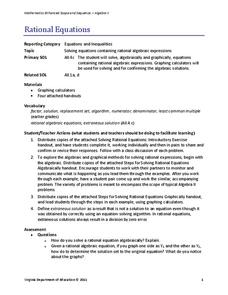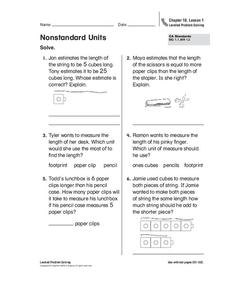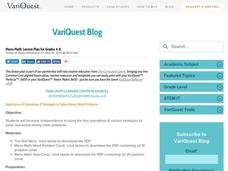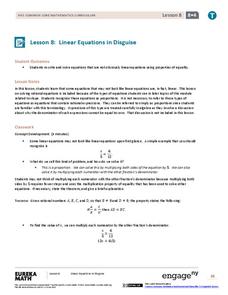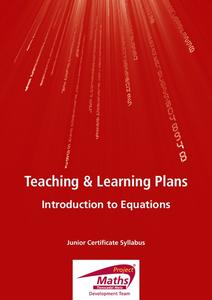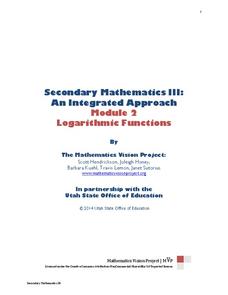Utah Education Network (UEN)
Real World Equations and Inequalities
Use of the resource = Opportunities for increased learning. Learners must use equations and inequalities to solve real-world and geometric problems.
Inside Mathematics
Quadratic (2006)
Most problems can be solved using more than one method. A worksheet includes just nine questions but many more ways to solve each. Scholars must graph, solve, and justify quadratic problems.
Virginia Department of Education
Rational Equations
Provide guidance and practice of the useful skill: solving rational equations using both an algebraic and graphical approach. Pupils solve increasingly more difficult rational equations using algebraic methods. After, they...
Norfork School District
Habits of Mind
Why do artists create? To solve a problem, of course. Young artists work individually and then in groups to create observational, imaginative, and narrative drawings in response to an assignment that requires them to employ all 16...
Curated OER
Nonstandard Units
Measuring length with nonstandard units is the focus of this word problem worksheet. Youngsters problem solve using cubes, paper clips, footprints, and pencils. They solve six problems.
EngageNY
Putting the Law of Cosines and the Law of Sines to Use
Use the Law of Cosines and the Law of Sines to solve problems using the sums of vectors. Pupils work on several different types of real-world problems that can be modeled using triangles with three known measurements. In the process,...
Curriculum Corner
Menu Math
Getting a meal, side dish, drink, and dessert can be delicious—but it can be expensive too! Practice addition and subtraction with money in a lesson plan that focuses on a sample menu, complete with task cards and word problems.
5280 Math
Go with the Flow
Round and round they go ... where they stop, only scholars will know. By writing systems of equations, classes determine the number of cars a roundabout can handle given specific constraints. Systems use up to six variables and become...
University of Utah
Simultaneous Linear Equations
Solve simultaneous linear equations, otherwise known as systems of linear equations. Pupils practice solving systems of linear equations by graphing, substitution, and elimination. The workbook provides a class activity and homework...
EngageNY
Introduction to Simultaneous Equations
Create an understanding of solving problems that require more than one equation. The lesson introduces the concept of systems of linear equations by using a familiar situation of constant rate problems. Pupils compare the graphs of...
Flipped Math
Unit 9 Review: Factoring
Make it complete. Pupils work through 16 problems to review factoring. The problems consist of straight factoring of polynomial expressions, solving equations by factoring, and applying factoring to real-world problems.
Worksheet Web
Learning About Rate
After reading a one-page passage on how to understand and solve distance/rate problems, young mathematicians answer six word problems that have them correctly set up the formula in order to solve for the distnace, rate, or time in the...
BW Walch
Creating Linear Equations in One Variable
The example of two travelers meeting somewhere along the road has been a stereotypical joke about algebra as long as algebra has existed. Here in this detailed presentation, this old trope gets a careful and approachable treatment....
HHS Math
Assignment 1.6: Solving Quadratic Equations
Practice solving different types of quadratic equations with these three worksheets. Problems include equations already factored, simple square root problems, and problems requiring different factoring techniques where the highest degree...
CCSS Math Activities
Smarter Balanced Sample Items: 6th Grade Math – Target A
Only in math problems do people buy 18 cans of tennis balls and no one wonders why. Scholars solve for the number of total tennis balls given the ratio of balls per can. This and other ratio word problems in a PowerPoint from Grade 6...
EngageNY
Solving Problems by Function Composition
Stay composed while solving problems. Learners put their knowledge of compositions to solve problems. To connect with the concept, scholars compose equations to answer questions from real-world situations. Finally, pupils practice using...
West Contra Costa Unified School District
Talking About Distance, Rate and Time
Connect the tortoise and the hare fable to mathematics. Learners first identify key terms related to distance, rate, and time. They then solve distance/rate/time problems using different representations.
Mathematics Assessment Project
Creating Equations
Using equations to model events. The resource contains four items that prompt individuals to write and solve basic equations. They must reason abstractly and quantitatively while attending to precision when solving the problems.
EngageNY
Linear Systems in Three Variables
Put all that algebra learning to use! Using algebraic strategies, learners solve three-variable systems. They then use the three-variable systems to write a quadratic equation given three points on the parabola.
EngageNY
Relationships Between Quantities and Reasoning with Equations and Their Graphs
Graphing all kinds of situations in one and two variables is the focus of this detailed unit of daily lessons, teaching notes, and assessments. Learners start with piece-wise functions and work their way through setting up and solving...
EngageNY
Linear Equations in Disguise
In the eighth segment of a 33-part unit, learners look at equations that do not appear to be linear at first glance. The equations are proportions where the numerators and denominators may have more than one term. To round out the...
Project Maths
Introduction to Equations
Do your pupils truly understand inverse operations, or is their understanding a little backward? Scholars learn the meaning of an equation in the second lesson of a four-part Algebra series. A series of activities begins with an...
EngageNY
Using Trigonometry to Determine Area
What do you do when you don't think you have enough information? You look for another way to do the problem! Pupils combine what they know about finding the area of a triangle and trigonometry to determine triangle area when they don't...
Mathematics Vision Project
Module 2: Logarithmic Functions
Build a solid understanding of logarithmic functions and equations. Five lessons in the module begin by developing the concept of a logarithm. The next lessons address graphing logarithmic functions, logarithmic properties, and solving...


